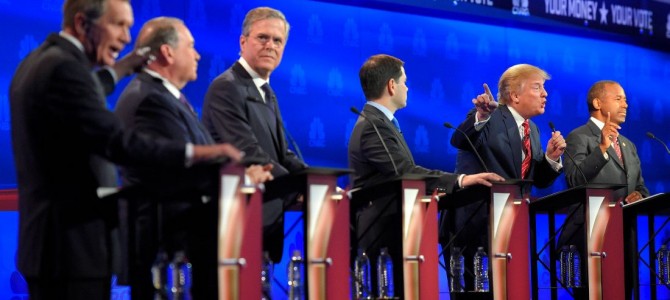Republican campaigns are trying to take control of the GOP debate process by drafting a list of demands to share with the networks broadcasting the debates, a move that likely circumvents the Republican National Committee’s role in negotiating debate conditions.
After the disastrous CNBC debate last week, individual Republican campaigns are trying to take on a larger role in negotiating with media sponsors to ensure that future debates are better organized and reflect the concerns of actual Republican voters, as opposed to the provincial concerns of New York- or D.C.-based journalists.
Sunday night, representatives for multiple GOP campaigns met with leaders of the RNC. What came out of that meeting was a draft letter, put together by lawyer Ben Ginsberg, with questions and requirements that candidates could send along to media sponsors.
The letter is essentially a list of demands phrased as questions aimed at the media sponsors. One telling question (“Will you commit to provide equal time/an equal number of questions to each candidate?”) alludes to the timing inequalities persistent in previous debates.
During last week’s debate, Ohio Gov. John Kasich spoke for 9 minutes and 42 seconds, making him #3 in the final tally of talking time among candidates, beating out Donald Trump, Ben Carson, and Ted Cruz, all of whom significantly outpoll Kasich among likely Republican voters.
NEW: Draft letter from Ben Ginsberg to campaigns about debates. What they want networks NOT to do pic.twitter.com/Q9VKrZ7Fk8
Shane Goldmacher (@ShaneGoldmacher) November 2, 2015
Though the specific language of the draft letter is still in flux, one particular question contains a laundry list of behaviors and activities that media should commit to not doing during future debates:
- Ask the candidates to raise their hands to answer a question
- Ask yes/no questions without time to provide a substantive answer
- Have a “lightening round”
- Allow candidate-to-candidate questioning
- Allow props or pledges by the candidates
- Have reaction shots of the members moderators during debates
- Use behind shots of the candidates showing their notes
- Show an empty podium during the break (describe how far away the bathrooms are)
- Leave microphones on during breaks
- Allow members of the audience to wear political messages (shirts, buttons, signs, etc.)
Before the start of each debate, the campaigns reportedly plan to hold a group conference call with the media sponsor to review the terms of the debate and discuss the debate’s format, a responsibility that the RNC previously handled. Going forward, the RNC’s role will be reduced to handling logistics and little else.
Sunday’s meeting occurred just one day after the RNC announced that Sean Spicer, the party’s chief strategist and communications director, would no longer be negotiating with media sponsors about debate details. Instead, chief of staff Katie Walsh and attorney Sean Cairncross will be responsible for future negotiations.
The candidates’ decision to directly negotiate debate terms with the networks isn’t anything new. This election cycle was the first time the RNC tried to maintain central control over the debates, a responsibility that Republican candidates are now taking back.
Here’s the current schedule for future Republican primary debates, via U.S. Presidential Election News, to be updated if necessary:
Tuesday, November 10, 2015
Fox Business/WSJ Republican Debate
9pm ET (8pm CT, 6pm PT) – Main Debate
6pm ET (5pm CT, 3pm PT) – Undercard Debate
Aired On: Fox Business Network (Channel finder)
Location: Milwaukee Theatre in Milwaukee, Wisconsin
Sponsors: Fox Business Network, Wall Street Journal
Moderators: Neil Cavuto, Maria Bartiromo, and Gerard Baker
Candidates: Candidates who score 2.5 percent or higher in an average of the four most recent national polls conducted through Nov. 4 will be invited to the main debate stage, the rest on the undercard stage
Tuesday, December 15, 2015
CNN/Salem Republican Debate
Aired On: CNN
Location: Las Vegas, Nevada
Sponsors: CNN, Salem Media Group
Candidates: To be determined
January, 2016 (Date TBD)
Fox News Republican Debate
Aired On: Fox News Channel
Location: Iowa
Sponsors: Fox News
Candidates: To be determined
Saturday, February 6, 2016
ABC/IJReview Republican Debate
Aired On: ABC
Location: St. Anselm College in Manchester, New Hampshire
Sponsors: ABC News, IJReview.com
Candidates: To be determined
Saturday, February 13, 2016
CBS News Republican Debate
Aired On: CBS
Location: The Peace Center in Greenville, South Carolina
Sponsors: CBS News
Moderator: John Dickerson
Candidates: TBD
Friday, February 26, 2016
Republican Debate
Aired On: ?
Location: University of Houston in Houston, Texas
Sponsors: National Review and NBC/Telemundo
Candidates: To be determined
Notes: NBC News has been removed by the RNC as a sponsor – details here.
March, 2016*
Fox News Republican Debate
Aired On: Fox News Channel
Location: TBD
Sponsors: Fox News
Candidates: To be determined
Thursday, March 10, 2016
CNN/Salem Republican Debate
Aired On: CNN
Location: Florida
Sponsors: CNN, Salem Media Group
Candidates: To be determined









